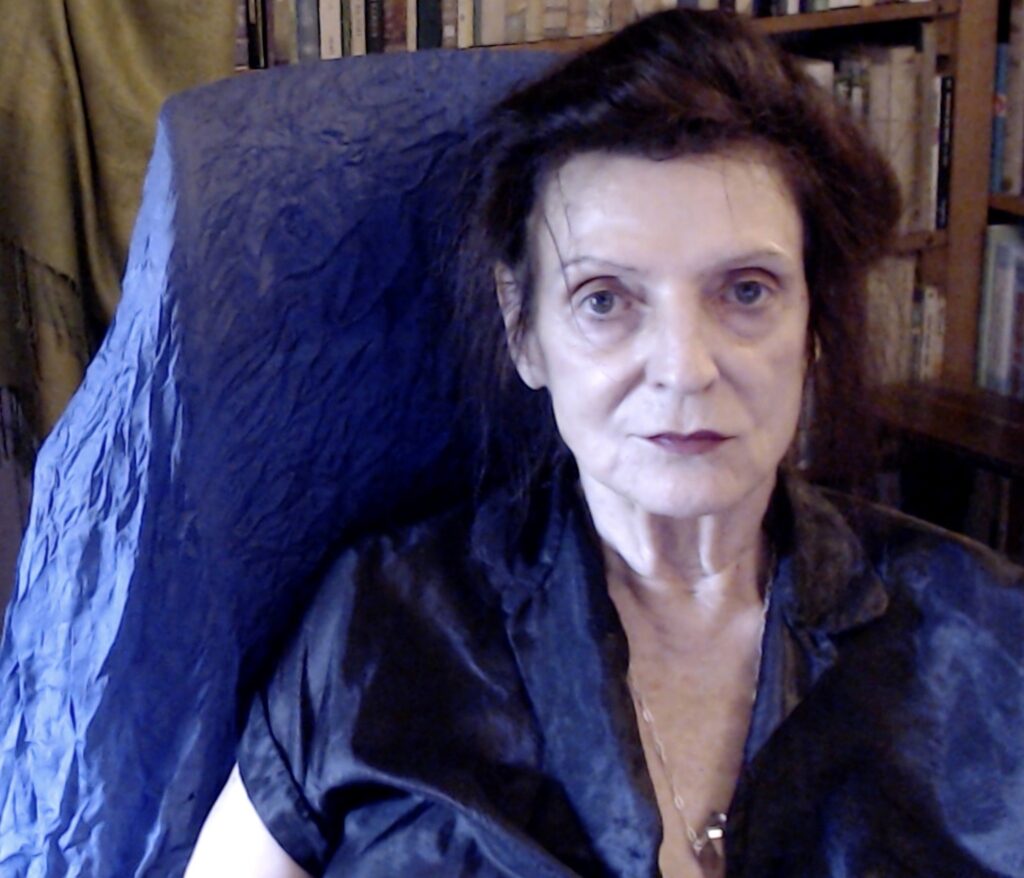Irmi Horn
Irmi Horn presents Fyodor Dostoyevsky: The Gentle. A Fantastic Tale. German by Alexander Eliasberg – published by Insel-Verlag in Leipzig in 1914, and compares it with the film version from 1969.
Dostoevsky’s “Fantastic Tale” describes the thoughts of a husband who restlessly paces up and down in his flat next to the laid-out corpse of his wife. Despairing and without hope, he reflects on his short life together with his gentle and proud spouse, whose suicide he was responsible for.
Dostoevsky found the inspiration in a brief newspaper notice that a young woman with an image of a saint had thrown herself out of a window. He calls his novella a “fantastic” tale, although he himself considers it to be highly realistic. The mention of the fantastic in his true-to-life story refers only to its form. The form of this poetry, Dostoevsky explains in the prefatory note, can neither be referred to a pure narrative nor to mere recordings. Rather, his monologue poetry represents a psychological investigation aimed exclusively at finding the truth. The revelation of truth, says Dostoevsky, is the real subject of this gigantic monologue, which the forty-one-year-old hypochondriac pawnbroker conducts with himself after the fatal window fall of his young wife of sixteen years, who lies laid out before him on two L’hombre tables pushed together in the guest room of his flat.
The monologue of the hypochondriac pawnbroker, aimed at finding the truth, drags on, as Dostoevsky writes, “in a slightly misleading form”; at one time he speaks to himself, at another time “he addresses, as it were, invisible listeners like a judge”. Without this second motif of a judge committed to justice, which exists alongside the truth motif, Dostoevsky’s poetry would lack the emphatic pathos of reality, which is to be found in people alone; everything else, laws, morals, life, state, faith are dead and moribund to him.
The content (Wikipedia)
A pawnbroker tries to “take revenge on society” by earning so much money from his business within three years that he can settle in the country. He feels excluded from society since he was dishonourably discharged from military service for cowardice. He is accused of avoiding a duel. His discharge leaves him impoverished and homeless for a while before he inherits 3000 roubles and is able to open the pawnshop.
In this situation, he meets a 16-year-old woman (“the gentle one”) whom the reader already knows, through the fictional author’s introduction, has committed suicide before the time of the narrative. She pawns her dear possessions to place advertisements in a newspaper seeking employment as a governess. The pawnbroker subtly humiliates her in these transactions, one situation in particular is mentioned where she brings him an icon which he eventually places in his own reliquary. Through investigation, the pawnbroker learns that the young woman is living with her tyrannical aunts and is to be married off to an unsavoury grocer. He takes advantage of the situation and asks for the young woman’s hand in marriage. In her distress, she marries him.
After an initially quiet marriage, a fight of sorts breaks out, triggered by disagreements over running the pawnshop. The gentlewoman flees the flat they share, although she has not been allowed to do so by the pawnbroker before. She meets with an officer named Jefimowitsch. The betrayed husband learns of this through the two aunts, whereupon he surprises his wife at a rendezvous with Jefimowitsch. The next morning he wakes up and feels a gun to his head. He opens his eyes briefly, but closes them again, whereupon the gentlewoman, after a while, gives up the obvious decision to kill him.
The pawnbroker then buys a second bed and a partition. The gentle one falls ill, recovers and lives very isolated. One day she sings in the presence of the pawnbroker. He deduces that it seems to her that he is not there (she usually sings only in his absence), whereupon he makes a declaration of love to her and offers to close his shop and take a trip to Boulogne (France). The gentle woman seems to be moved and apologises, promising to respect him from then on. He leaves briefly to organise the passports for the trip – when he returns, she has thrown herself out of the window.
INFORMATION
- Please make reservations not later than 2 hours before the programme begins: kunstGarten@mur.at or +43 316 262787

